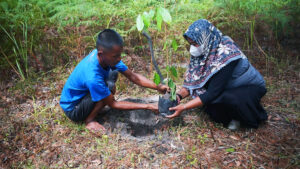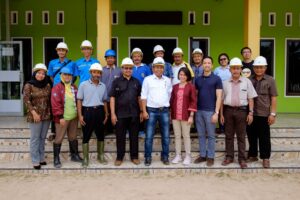At Unilever, we are committed to achieving a deforestation-free supply chain. We recognise that the private sector must work in partnership to tackle challenging issues. Since joining the Forest Positive Coalition, we engaged with other industry members to align on processes to strategise collective actions in production landscapes. Through a collaborative knowledge-sharing approach, the coalition highlights metrics of measurements, claims, implementation outcomes and learnings by distributing shared experiences to the wider community. This encourages and fosters a learning environment for all stakeholders to strive, scale and achieve sustainable impact. Our investments into landscape approaches promote sustainable production through training and certification of smallholders as well as environmental protection and restoration.

Community members planting tree saplings in Sabuai restoration site. Credit: Unilever
For example, since 2016 Unilever partnered with Yayasan Inobu (now known as Kaleka) in Central Kalimantan, Indonesia to support a jurisdictional or landscape approach to sustainable palm oil certification, with the district governments of Seruyan and Kotawaringin Barat. The landscape is diverse with peatland swamp forests, coastal region, and lowland tropical forests, providing habitat for fauna like orangutan, proboscis monkeys, and sun bears. The districts are also home to indigenous peoples, many who practice traditional livelihoods.
Our partnership has four workstreams:
- Governance: multi-stakeholder processes for sustainable and responsible commodity production, through issuance of regulations, policies, and creation of institutions to support certification.
- Human rights protection: We supported a comprehensive human rights impact assessment in the two districts, developed a system for registering and handling social conflicts and mapping customary villages to support recognition of customary land rights and prevent future conflicts.
- Smallholder empowerment: certify smallholders according to RSPO and ISPO standards, provide training in GAP (good agriculture practices) and regenerative agriculture practices
- Conservation and restoration: protection of forests and other ecosystems at district and village levels; restore peatland, riparian, and dry lowlands areas through community-based approaches.
The Mosaik Initiative aspires for sustainable and inclusive oil palm landscape, to protect and restore ecosystems that provide vital resources for palm oil production, and where farmers and local communities are empowered to thrive. The jurisdictional programme will reduce poverty, uplift communities, and improve yields through training in sustainable and good agriculture practices and supporting farmers to achieve certification.

Unilever and the wider team and community working on the Mosaik Initiative. Credit: Unilever
In 2019 and 2022, we travelled to central Kalimantan to visit the sites of the programme. We saw significant changes on the ground and engaged with smallholders in the village of Pangkalan Tiga. Many smallholders recognised the benefits of agriculture training and gathered the knowhow to conduct proper palm oil yield management; they also acknowledged the opportunities derived from extra income earned through the premiums of certified palm oil that provided means for community facilities upgrade. Furthermore, we travelled to our community-based restoration projects and saw areas replanted with various plant species with cultural, economic and restoration value. The restoration work with Inobu and the local community serves great opportunities to restore wildlife habitats while reducing the incidence of wildfires and flooding.
Our partnership has RSPO certified over 1000 farmers, mapped 1893 farmers, trained over 254 smallholders on GAP or regenerative practices and planted over 23,000 trees.
Unilever is proud to support this initiative, in line with the Coalition’s Landscape Ambition to help transform production landscapes for positive outcomes. Investing in jurisdictional approaches like the Mosiak Initiative is a strong example of how consumer goods companies can help drive positive impact for climate, people, and nature in local communities worldwide.
